2008 年专业英语八级考试真题及答案
SECTION A MINI-LECTURE
In this section you will hear a mini-lecture. You will hear the lecture ONCE ONLY.
While listening, take notes on the important points. Your notes will not be marked,
but you will need them to complete a gap-filling task after the mini-lecture. When
the lecture is over, you will be given two minutes to check your notes, and another
ten minutes to complete the gap-filling task on ANSWER SHEET ONE. Use the blank sheet
for note-taking.
The Popularity of English
I. Present status of English
A. English as a native/first language
B. English as a lingua franca: a language for communication among people
whose (1)______ are different
C. Number of people speaking English as a first or a second language:
— 320-380 million native speakers
— 250- (2) _____ million speakers of English as a second language
II. Reasons for the popular use of English
A. (3) ____ reasons
— the Pilgrim Fathers brought the language to America;
— British settlers brought the language to Australia;
— English was used as a means of control in (4)_____
B. Economic reasons
— spread of (5) _____
— language of communication iii the international business community
C. (6)______ in international travel
— use of English in travel and tourism
— signs in airports
— language of announcement
— language of (7) ______
D. Information exchange
— use of English in the academic world
— language of (8) _____ or journal articles
E. Popular culture
— pop music on (9)______
— films from the USA
III. Questions to think about
A. status of English in the future
B. (10) ______ of distinct varieties of English
SECTION
In
re
notes
illing
mini-lecture.
the
need
the
You
important
them
marked,
you
the mini-lecture.
but
this section
ONCE ONLY
Your
gap-f
wi
you
points.
a
listening,takenotes
you
will hear
a
A
MINI-LECTURE
lecture
is
over,
willhear
the lectu
on
will
When
tocomplete
while
will
not be
task after
�
ll
be
given
twominutes
to
check
complete
the
gap-filling task
your
notes,
and
onANSWER SHEET
another ten
ONE.
Use
the
minutes
blank
to
sheet
for note-taking.
the mini-lecture
of
English
to
listen
Popularity
Now
The
Good morning,
s
is
lecture
widely
the
is
with
really
become
in
used
largestnumber
the
a
lingua
language
refers
to
a
every
about
one.
the
Today’
popularity
of
English. As
we
all
know,English
world.
Although
English
is
not
the language
of
native
or
franca. Then
which
is
language
first
what is
alingua
it
The
speakers,
franca?
has
te
for communicationbetw
each other
from
widely
adopted
two speakers
whose
native
languages
are
different
and
where
speakers
are
using
it
as
a
second
both
an
oneor
when
the lingua
For
example,
is
either
English
as
Indian
talks
franca.
to
Then
second
aSingaporean
actually
how
language?
a
first
or
a
language.
th
English,
using
many peoplespeak
Some
researchers
sug
a
few
yearsago that
million people
spoke
between
English as
320-
a
first
language,
and
anywaybetwe
rm
een
’
s,
en
English
gested
380
en
350
le
who
that
250-
did
ow
status
sons for
easons
ors
’s
First
ory. As
that
go
is
coast
not
em
esire
ter, the
of
oo.
n
1788,
s,
the
million as
a
second
language.
And
of
course, if
we
include
number
arelearning English
increase
there?
English get
may
of
popularity?
thepopularity
There
of
a
foreign
as
dramatically.Then
That
are
is, how
in
fact
language
all over
the
we
may
ask
did
a
English
of
number
question:
thepresent
a
gain
interlocking
English
as
a
lingua
franca.
Many
of
are
historical, but
they
alsoinclude economic
and
cultural
have
influenced
and sustained
the spread
of
thelanguage.
peop
world,
h
rea
the r
fact
Let
through the
reasons
the
historical
one
reason.
by
This
one.
is
know,
1620
we
in
just
when
thePilgrim
after
their
Fathers
journey from
beliefs,
a
set
of
religious
to
on
the
the
related
landed
England,they brought
a
spirit
pioneering
colonial
Massachusetts
hist
with
or
a
th
d
la
the same
in
the language
inAustralia, t
cove o
Sydney
forcolonization,
but also
their
language.
Although
many years
Americans
broke
awayfrom
their
colonial
master,
English
When
Commander
26thJanuary,
remained
and still
does.
It
was
Phillip
planted
the
British flag
it
was
but
also
not
just
alanguage.
rapidly
became
a
In
a
bunch
British convicts
on
of
parts
of
other
unifying
the former
means
ordominating
English
example,
it
languages
ous
systemproblematic.
became
a
made the
lingua
use
So
the
of
any
imposition
one of
of
English as
them
franca
in
India
or
guardian
Empire,
their
British
of
For
variety ofindigen
control.
whole
one
country
language o
a
as
a
the
�
f
administration
helpsmaintain
the
English
traveled
around
colonial
many
power
parts
has
of
faded
that
colonizers’ control and
those
theworld
in
power,
days.
thus
And
away,
it
is
still
widely
u
asa main
as
apart
at
or
Jamaica
least
an
institutional
language
in
countries
as
and Pakistan,Uganda
and
New
Zealand.
That
is
th
factor.
first
long after
sed
far
e
Now
spread
mmerce
omenon
ers
of
has
of
the second
major
factor
of
English
has
been the
commercethroughout
The spread
of
international
taken
English
along
with it.This
20th century
in
the
the spread
world.
co
phen
manytravel
sights
Brazil,
China,
for
is
the
the first
of
diverse as
of
MacDonald’
globalization.
see when
is
example,
arriving in
the
yellowtwin
arch
Therefore,
countries
one
as
sign
restaurant
or
some
other
is
used
as
the language
famous
of
outlets
brands
communication
in
Andwithout
int
the
businesscommunity.
in
the
international
business community.
the third
factor
related to
the
popular
use
of
international
travel.And
you
will
carried
on
the case,
around
as
the world
in
the multi-lingualism
of
English is
travel
the
and t
find
that
English.
much
Ofcourse
this
is
countries
demonstrate. But
a
visit
will
show signs
notonly in
the
with English,
just as
many
airline
whatever
the
language of
the
to
language
many tourism
most
of
workers
airports
coun
announcementsbroadcast
airport i
country
that
the
s
fast
doubt,
food
English
is
ernational
And
booming
ourism
not
in
on
try
in
always
manydifferent
the
but also
English
globe
too,
situated
in.
far, English
world.
s
So
l
nother
in
of
around
a
iverse
d
The
of
many
countries
is
also
and
the preferred
is
usedwidely
language
in
of
air
traffic
sea travel
communication.
factor
has
As
the
we
world
all
conferences,for
astronomy,
as
takes
to
something
a
know,
do
great
in
example,and
trio psychology
place
default
language.
with informationexchange
deal of
academic
discourse
around
English.
many
It
journal
often
is
a
articles in
and
geology
haveEnglish
lingua
fields
as
franc
as
d
kin
a
contro
A
the
last
factor
I
here concerns
popular
culture.
In
the
western
cite
English is
English
be
English speakers
can
world,
Pop
who
at
music
are
glishmedium
least
in
not
adominating
on
sing
heard
can
language
many
words
in
popular culture.
people
radios,thus many
from
their
favorite
or
En
TV
cinema-goers
songs.
And many
frequentlyhear
can
people
English
who
in
are regular
subtitle
films
coming
out
of
viewers
USA.
the
Now, to
s
behind
1
world
lecture,
the
sum
up
in
have
today’
reviewed
we
popular use
some
of
the
reasons
or
factors that
lie
of
English
as
the
No.
language.
Before
we
finish, I'd
like
for
you
to
think
about.
Is
the
status
of
toleave a
as
English
few questions
the No.
�
worldlanguage
1
that become
a
less
take
languages
se
y
questions
are
pondering
worth
sure
in
the
future?
Will
it
split
into
varieties
mutually intelligible?Or
will
the
not
place
easy
of
to
overafter
the
English
answer,
as
I
lecture.
some
other
language
they
this brings
But
or
language
in
future?The
are definitel
end
to
the
world
know.
Ok,
of
today’
s
lecture.
Thank
you
for your
attention.Now
you
have two
minutes
to
task onAns
check
then please
finish
the
gap-filling
notes.
your
1
in
10
INTERVIEW
And
minutes.
Sheet
wer
SECTION B
In this section you will hear everything ONCE ONLY. Listen carefully and then answer
the questions that follow. Mark the correct
answer to each question on your colored
answer sheet.
Questions 1 to 5 are based on an interview. At the end of the interview you will
be given 10 seconds to answer each of the following five questions.
Now listen to the interview
1. Mary doesn't seem to favour the idea of a new airport because
A. the existing airports are to be wasted
B. more people will be encouraged to travel.
C. more oil will be consumed.
D. more airplanes will be purchased.
2. Which of the following is NOT mentioned by Mary as a potential disadvantage?
A. More people in the area.
B. Noise and motorways.
C. Waste of land.
D. Unnecessary travel.
3. Freddy has cited the following advantages for a new airport EXCEPT
A. more job opportunities.
B. vitality to the local economy.
C. road construction,
D. presence of aircrew in the area.
4. Mary thinks that people dont need to do much travel nowadays as a result of
A. less emphasis on personal contact.
B. advances in modern telecommunications.
C. recent changes in peoples concepts.
D. more potential damage to the area
5. We learn from the conversation that Freddy is Marys ideas,
A. strongly in favour of
B. mildly in favour of
C. strongly against
D. mildly against
SECTION C
In this section you will hear everything ONCE ONLY. Listen carefully and then answer
the questions that follow. Mark the correct answer to each question on your coloured
NEWS BROADCAST
�
answer sheet.
Question 6 is based on the following news. At the end of the news item, you will
be given 10 seconds to answer the question. Now listen to the news.
6. What is the main idea of the news item?
A. A new government was formed after Sundays elections.
B. The new government intends to change the welfare system.
C. The Social Democratic Party founded the welfare system.
D. The Social Democratic Party was responsible for high unemployment.
Questions 7 and 8 are based on the following news. At the end of the news item, you
will be given 20 seconds to answer the questions.Now listen to the news.
7. The tapes of the Apollo-11 mission were first stored in
A. a U.S. government archives warehouse.
B. a NASA ground tracking station.
C. the Goddard Space Flight Centre.
D. none of the above places.
8. What does the news item say about Richard Nafzger?
A. He is assigned the task to look for the tapes.
B. He believes that the tapes are probably lost.
C. He works in a NASA ground receiving site.
D. He had asked for the tapes in the 1970s.
Questions 9 and 10 are based on the following news. At the end of the news item,
you will be given 20 seconds to answer the questions.Now listen to the news.
9. The example in the news item is cited mainly to show
A. that doctors are sometimes professionally incompetent
B. that in cases like that hospitals have to pay huge compensations.
C. that language barriers might lower the quality of treatment.
D. that language barriers can result in fatal consequences.
10. According to Dr. Flores, hospitals and clinics
A. have seen the need for hiring trained interpreters.
B. have realized the problems of language barriers.
C. have begun training their staff to be bilinguals.
D. have taken steps to provide accurate diagnosis.
PART II
In this section there are four reading passages followed by a total of 20
multiple-choice questions. Read the passages and then mark your answers on your
coloured answer sheet。
TEXT A
At the age of 16, Lee Hyuk Joons life is a living hell. The South Korean 10th grader
gets up at 6 in the morning to go to school, and studies most of the day until returning
home at 6 p.m. After dinner, its time to hit the books again—at one of Seouls many
so-called cram schools. Lee gets back home at 1 in the morning, sleeps less than
five hours, then repeats the routine—five days a week. Its a grueling schedule,
but Lee worries that it may not be good enough to get him into a top university.
Some of his classmates study even harder.
READING COMPREHENSION (30 MIN)
�
South Koreas education system has long been highly competitive. But for Lee and the
other 700,000 high-school sophomores in the country, high-school studies have gotten
even more intense. Thats because South Korea has conceived a new college-entrance
system, which will be implemented in 2008. This years 10th graders will be the first
group evaluated by the new admissions standard, which places more emphasis on grades
in the three years of high school and less on nationwide SAT-style and other selection
tests, which have traditionally determined which students go to the elite colleges.
The change was made mostly to reduce what the government says is a growing education
gap in the country: wealthy students go to the best colleges and get the best jobs,
keeping the children of poorer families on the social margins. The aim is to reduce
the importance of costly tutors and cram schools, partly to help students enjoy a
more normal high-school life. But the new system has had the opposite effect. Before,
students didnt worry too much about their grade-point averages; the big challenge
was beating he standardized tests as high-school seniors. Now students are competing
against one another over a three-year period, and every midterm and final test is
crucial. Fretful parents are relying even more heavily on tutors and cram schools
to help their children succeed.
Parents and kids have sent thousands of angry online letters to the Education
Ministry complaining that the new admissions standard is setting students against
each other. "One can succeed only when others fail,” as one parent said.
Education experts say that South Koreas public secondary-school system is foundering,
while private education is thriving. According to critics, the countrys high schools
are almost uniformly mediocre—the result of an egalitarian government education
policy. With the number of elite schools strictly controlled by the government, even
the brightest students typically have to settle for ordinary schools in their
neighbourhoods, where the curriculum is centred on average students. To make up for
the mediocrity, zealous parents send their kids to the expensive cram schools.
Students in affluent southern Seoul neighbourhoods complain that the new system will
hurt them the most.
Nearly all Korean high schools will be weighted equally in the college-entrance
process, and relatively weak students in provincial schools, who may not score well
on standardized tests, often compile good grade-point averages.
Some universities, particularly prestigious ones, openly complain that they cannot
select the best students under the new system because it eliminates differences among
high schools. Theyve asked for more discretion in picking students by giving more
weight to such screening tools as essay writing or interviews.
President Roh Moo Hyun doesnt like how some colleges are trying to circumvent the
new system. He recently criticized "greedy" universities that focus more on finding
the best students than faying to "nurture good students". But amid the crossfire
between the government and universities, the countrys 10th graders are feeling the
stress. On online protest sites, some are calling themselves a “cursed generation”
and “mice in a lab experiment”. It all seems a touch melodramatic, but thats the
South Korean school system.
11. According to the passage, the new college-entrance system is designed to
�
A. require students to sit for more college-entrance tests.
B. reduce the weight of college-entrance tests.
C. select students on their high school grades only.
D. reduce the number of prospective college applicants.
12. What seems to be the effect of introducing the new system?
A. The system has given equal opportunities to students.
B. The system has reduced the number of cram schools.
C. The system has intensified competition among schools.
D. The system has increased students study load.
13. According to critics, the popularity of private education is mainly the result
of
A. the governments egalitarian policy.
B. insufficient number of schools:
C. curriculums of average quality.
D. low cost of private education.
14. According to the passage, there seems to be disagreement over the adoption of
the new system between the following groups EXCEPT
A. between universities and the government.
B. between school experts and the government.
C. between parents and schools.
D. between parents and the government.
15. Which of the following adjectives best describes the authors treatment of the
topic?
A. Objective.
B. Positive.
C. Negative.
D. Biased.
TEXT B
Wilfred Emmanuel-Jones was a teenager before he saw his first cow in his first field.
Born in Jamaica, the 47-year-old grew up in inner-city Birmingham before making a
career as a television producer and launching his own marketing agency. But deep
down he always nurtured every true Englishmans dream of a rustic life, a dream that
his entrepreneurial wealth has allowed him to satisfy. These days hes the owner of
a thriving 12-hectare farm in deepest Devon with cattle, sheep and pigs. His latest
business venture: pushing his brand of Black Fanner gourmet sausages and barbecue
sauces. “My background may be very urban,” says Emmanuel-Jones.
“But it has given me a good idea of what other urbanites want.”
And of how to sell it. Emmanuel-Jones joins a herd of wealthy fugitives from city
life who are bringing a new commercial know-how to British farming. Britains
burgeoning farmers markets -numbers have doubled to at least 500 in the last five
years—swarm with specialty cheesemakers, beekeepers or organic smallholders who
are redeploying the business skills they learned in the city. "Everyone in the rural
community has to
come to terms with the fact that things have changed." Says Emmanuel-Jones. "You
�
can produce the best food in the world, but if you dont know how to market it, you
are wasting your time. We are helping the traditionalists to move on."
The emergence of the new class of superpeasants reflects some old yearnings. If the
British were the first nation to industrialize, they were also the first to head
back to the land. "There is this romantic image of the countryside that is
particularly English," says Alun Howkins of the University of Sussex, who reckons
the population of rural England has been rising since 1911. Migration into rural
areas is now running at about 100,000
a year, and the hunger for a taste of the rural life has kept land prices buoyant
even as agricultural incomes tumble. About 40 percent of all farmland is now sold
to "lifestyle buyers" rather than the dwindling number of traditional farmers,
according to the Royal Institution of Chartered Surveyors.
Whats new about the latest returnees is their affluence and zeal for the business
of producing quality foods, if only at a micro-level. A healthy economy and surging
London house prices have helped to ease the escape of the would-be rustics. The media
recognize and feed the fantasy. One of the big TV hits of recent years, the "River
Cottage" series, chronicled the attempts of a London chef to run his own Dorset farm.
Naturally, the newcomers cant hope to match their City salaries, but many are happy
to trade any loss of income for the extra job satisfaction. Who cares if theres no
six-figure annual bonus when the land offers other incalculable compensations?
Besides, the specialist producers can at least depend on a burgeoning market for
their products. Todays eco-aware generation loves to seek out authentic ingredients.
"People like me may be making a difference in a small way," Jan McCourt, a onetime
investment banker now running his own 40-hectare spread in the English Midlands
stocked with rare breeds.Optimists see signs of far-reaching change: Britain isnt
catching up with mainland Europe; its leading the way. “Unlike most other countries,
where artisanal food production is being eroded, here it is being recovered," says
food writer Matthew Fort. “It may be the mark of the next stage of civilization
that we rediscover the desirability of being a peasant.” And not an investment
banker.
16. Which of the following details of Wilfred Emmanuel-Jones is INCORRECT?
A. He was born and brought up in Birmingham.
B. He used to work in the television industry.
C. He is wealthy, adventurous and aspiring.
D. He is now selling his own quality foods.
17. Most importantly, people like Wilfred have brought to traditional British
farming
A. knowledge of farming.
B. knowledge of brand names.
C. knowledge of lifestyle.
D. knowledge of marketing,
18. Which of the following does NOT contribute to the emergence of a new class of
farmers?
A. Strong desire for country life.
�
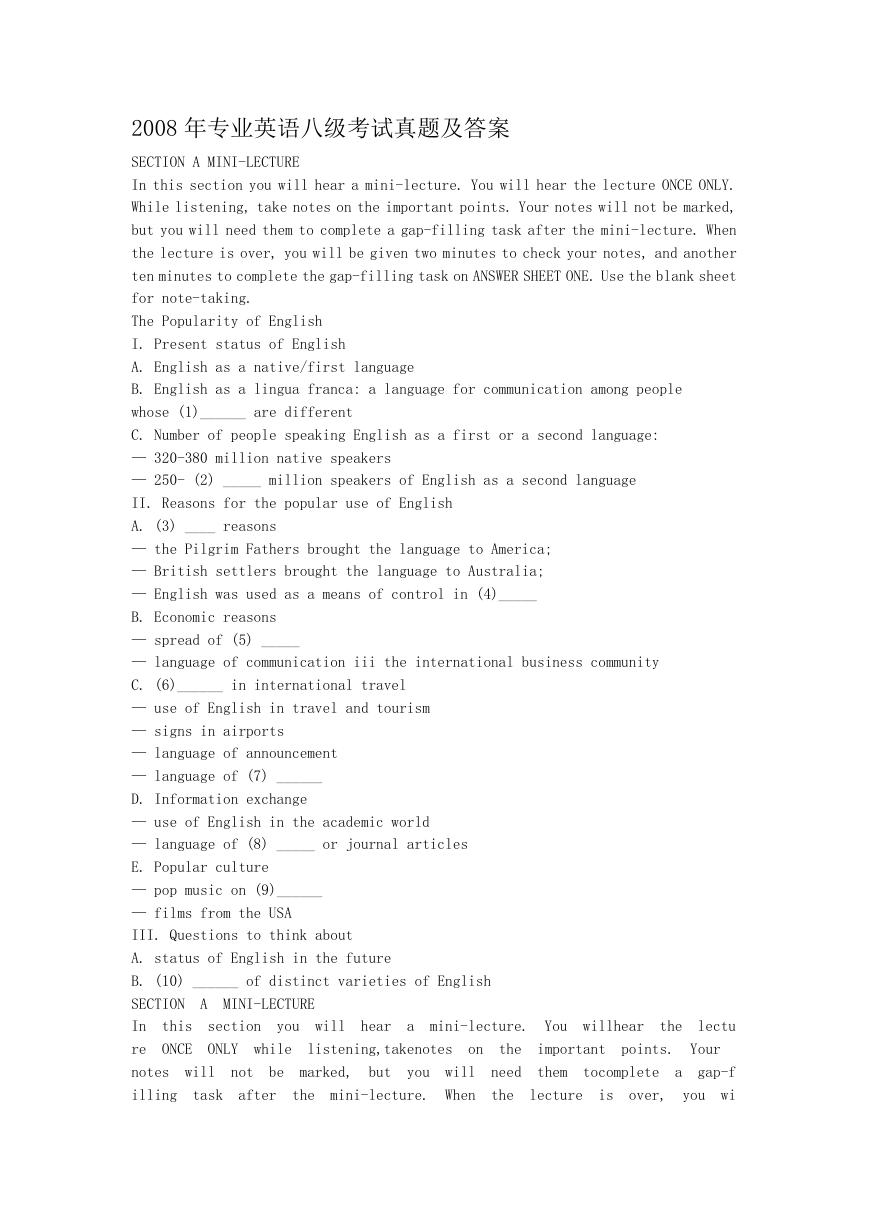
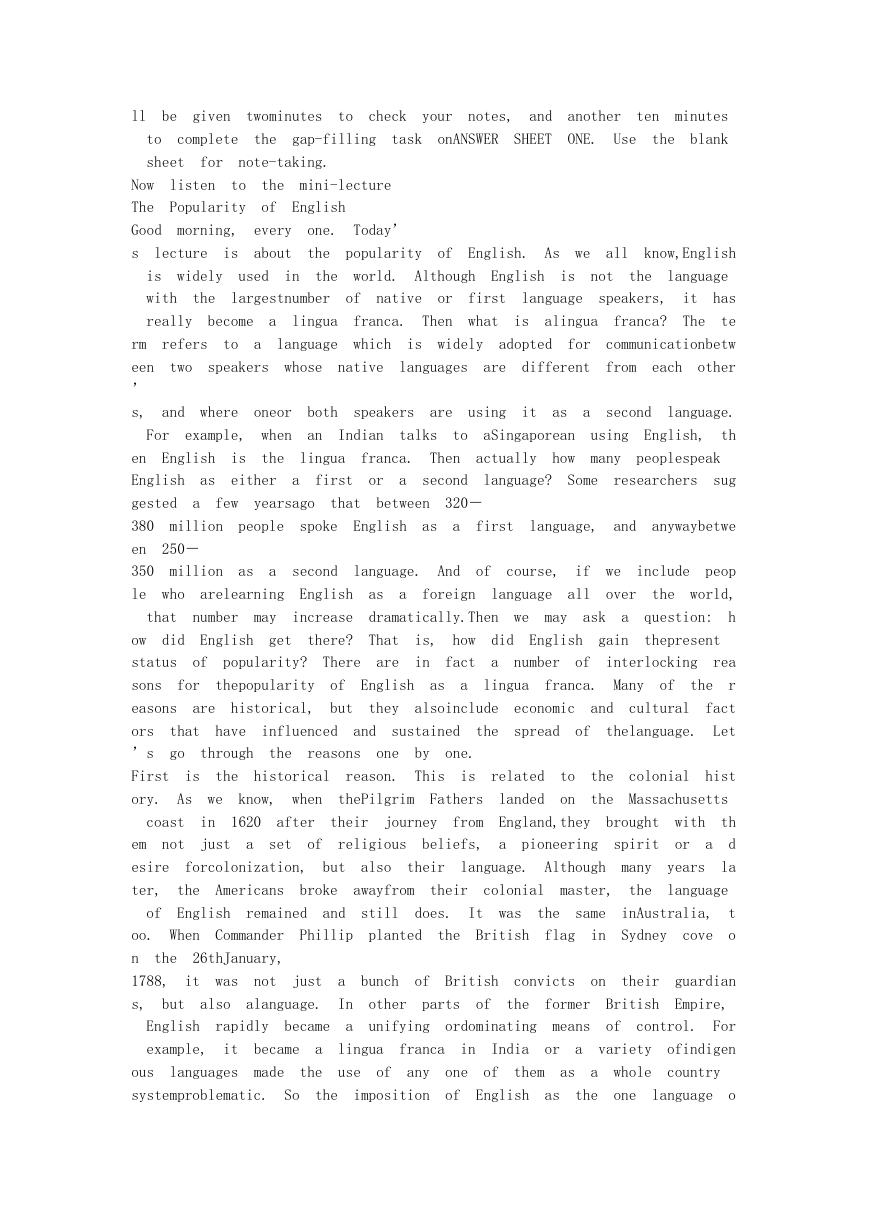
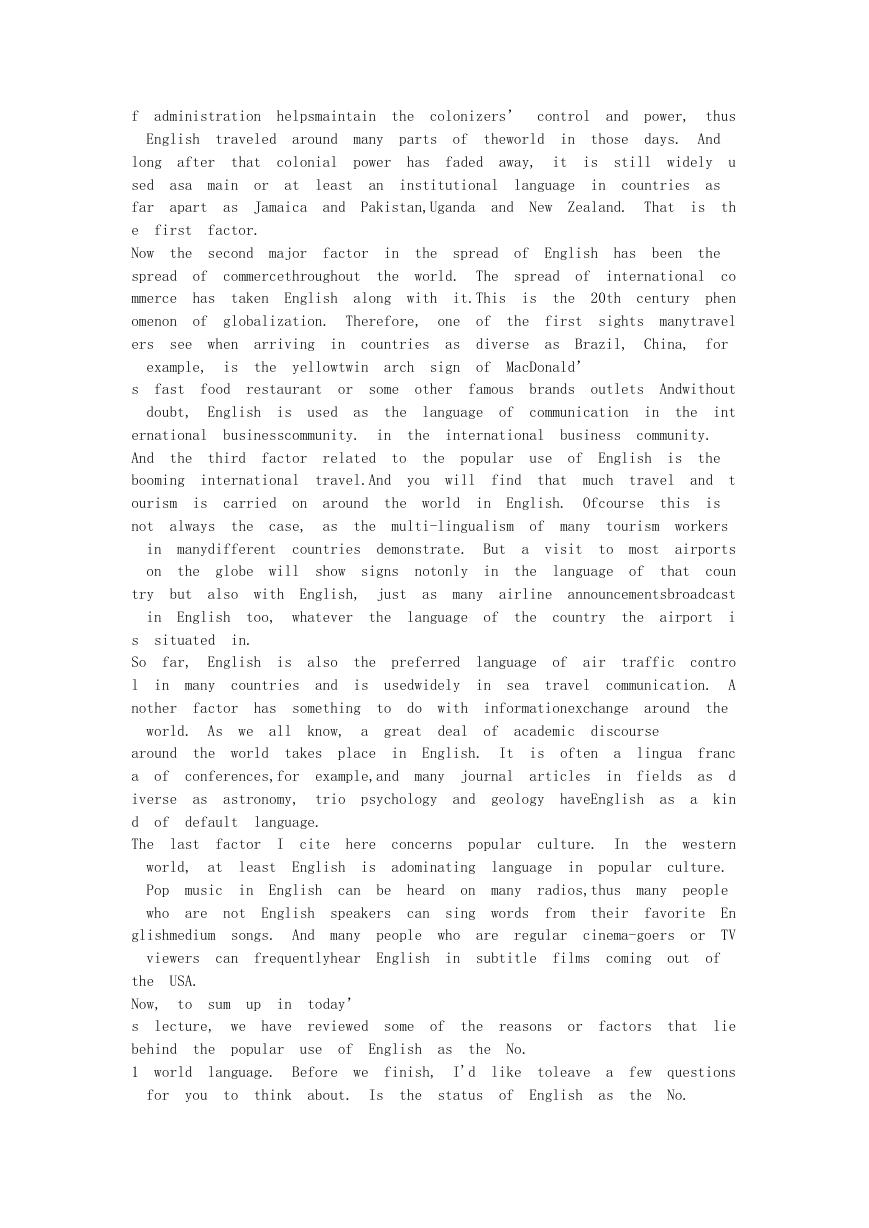

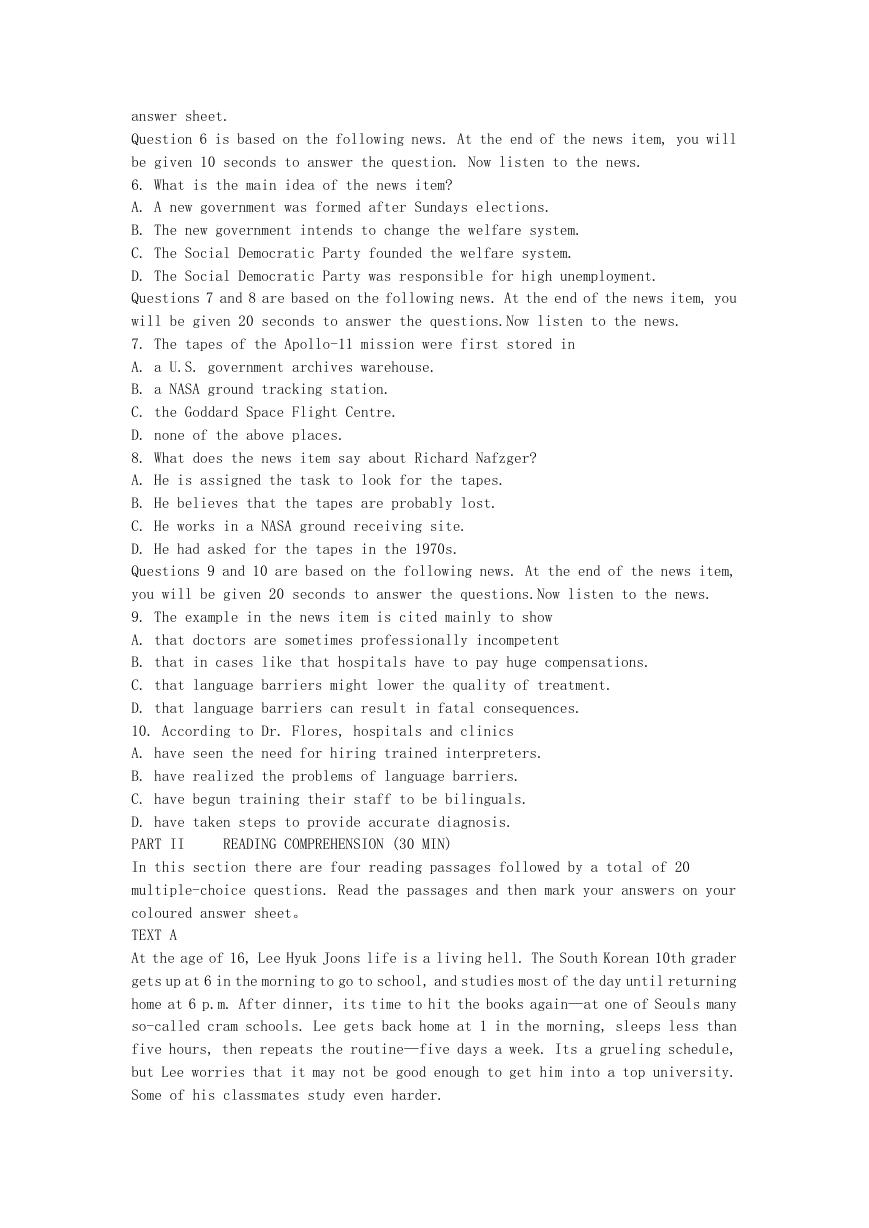

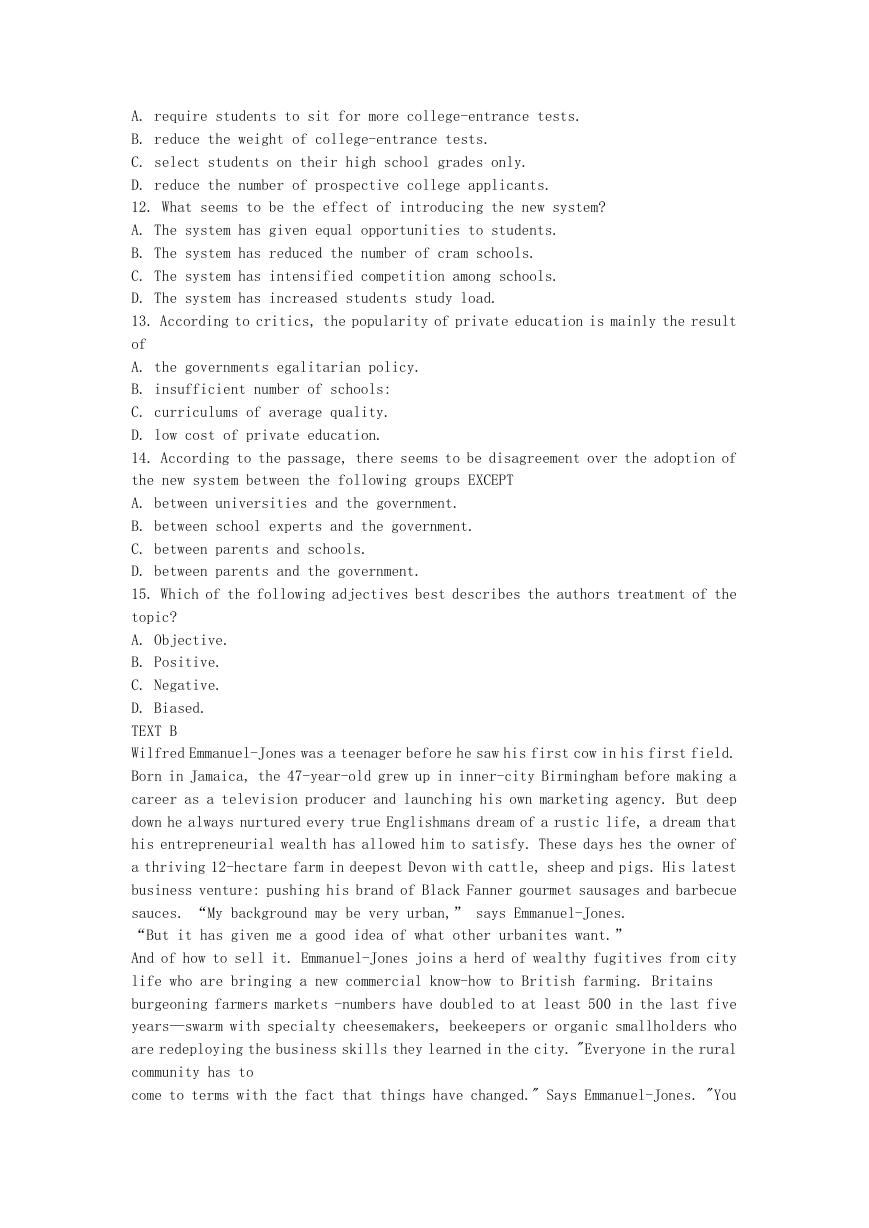
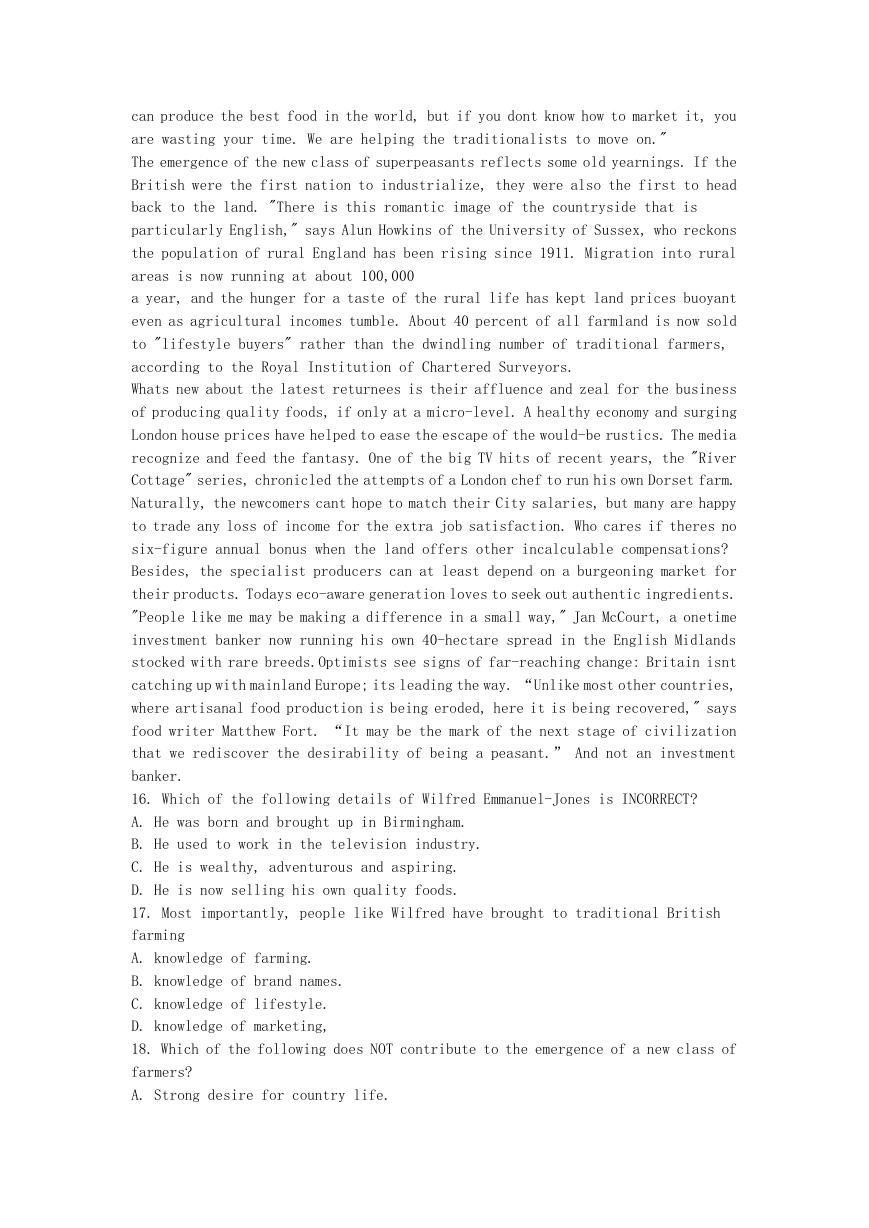








 2023年江西萍乡中考道德与法治真题及答案.doc
2023年江西萍乡中考道德与法治真题及答案.doc 2012年重庆南川中考生物真题及答案.doc
2012年重庆南川中考生物真题及答案.doc 2013年江西师范大学地理学综合及文艺理论基础考研真题.doc
2013年江西师范大学地理学综合及文艺理论基础考研真题.doc 2020年四川甘孜小升初语文真题及答案I卷.doc
2020年四川甘孜小升初语文真题及答案I卷.doc 2020年注册岩土工程师专业基础考试真题及答案.doc
2020年注册岩土工程师专业基础考试真题及答案.doc 2023-2024学年福建省厦门市九年级上学期数学月考试题及答案.doc
2023-2024学年福建省厦门市九年级上学期数学月考试题及答案.doc 2021-2022学年辽宁省沈阳市大东区九年级上学期语文期末试题及答案.doc
2021-2022学年辽宁省沈阳市大东区九年级上学期语文期末试题及答案.doc 2022-2023学年北京东城区初三第一学期物理期末试卷及答案.doc
2022-2023学年北京东城区初三第一学期物理期末试卷及答案.doc 2018上半年江西教师资格初中地理学科知识与教学能力真题及答案.doc
2018上半年江西教师资格初中地理学科知识与教学能力真题及答案.doc 2012年河北国家公务员申论考试真题及答案-省级.doc
2012年河北国家公务员申论考试真题及答案-省级.doc 2020-2021学年江苏省扬州市江都区邵樊片九年级上学期数学第一次质量检测试题及答案.doc
2020-2021学年江苏省扬州市江都区邵樊片九年级上学期数学第一次质量检测试题及答案.doc 2022下半年黑龙江教师资格证中学综合素质真题及答案.doc
2022下半年黑龙江教师资格证中学综合素质真题及答案.doc